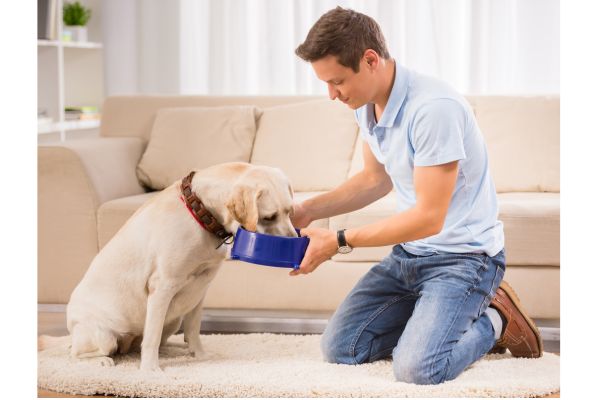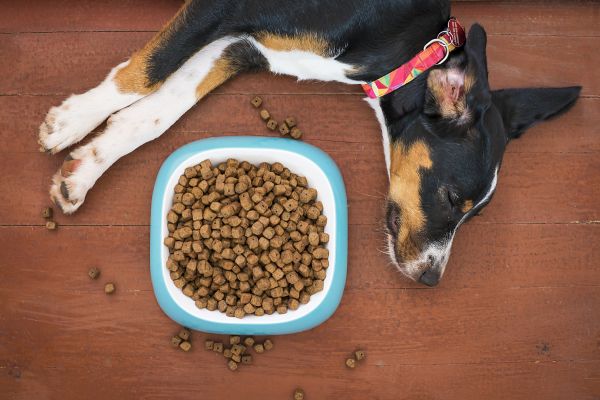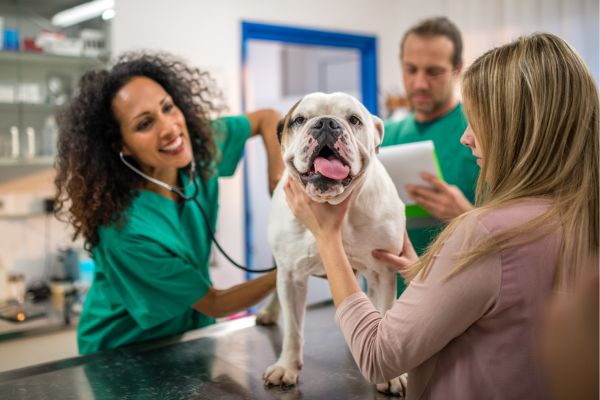Effective Solutions: What Can You Give A Dog For Diarrhea
Diarrhea, the unwelcome guest that often crashes into our lives uninvited. It disrupts routines, creates discomfort, and leaves us desperately seeking solutions.
But what happens when this uninvited visitor is not a human but instead a beloved furry friend? Canines are not immune to the miseries of diarrhea either, and as responsible pet owners, we must seek ways to alleviate their suffering.
This article aims to guide dog owners through the perplexing world of canine diarrhea by providing objective information on appropriate remedies. By identifying the underlying cause, adjusting the diet, offering probiotics, and ensuring proper hydration with fluids and electrolytes, we can provide relief to our faithful companions.

However, it is important to remember that persistent symptoms require veterinary attention. So let’s embark on this journey together, serving our loyal four-legged friends with the knowledge they deserve!
Key Takeaways
- Mild cases of diarrhea in dogs can often be resolved by fasting for 12-24 hours and then introducing a bland diet of boiled rice and chicken.
- It is important to consult a veterinarian before using over-the-counter remedies for canine diarrhea.
- Adding pumpkin puree or probiotics to the dog’s diet can help firm up loose stools and promote healthy gut flora.
- If home remedies do not alleviate diarrhea symptoms, it is advisable to seek veterinary assistance for a comprehensive evaluation and appropriate treatment options.
Identify the Cause of the Diarrhea
Identifying the underlying cause of diarrhea in canines is crucial for effective treatment and management. Diarrhea in dogs can be caused by various factors, including:
- Dietary indiscretion
- Bacterial or viral infections
- Parasites
- Food allergies or intolerances
- Certain medications
The treatment options for dog diarrhea depend on the specific cause. In cases of mild diarrhea caused by dietary indiscretion or a sudden change in diet, fasting for 12 to 24 hours followed by a bland diet consisting of boiled rice and chicken can help resolve the issue.

However, if the diarrhea persists or is accompanied by other symptoms such as vomiting or lethargy, veterinary intervention is necessary. The veterinarian may perform diagnostic tests to identify the exact cause and prescribe appropriate medication or recommend dietary adjustments accordingly.
It is important to consult a veterinarian before administering any over-the-counter remedies to ensure safe and effective treatment for canine diarrhea.
Adjust the Diet
Adjusting the diet of a canine experiencing gastrointestinal upset can play a crucial role in alleviating symptoms. Diet modifications can help restore balance to the digestive system and provide relief from diarrhea.
When a dog is suffering from diarrhea, it is important to withhold food for 12-24 hours to allow the gastrointestinal tract to rest. After this period, a bland diet consisting of boiled white rice and boiled lean meat like chicken or turkey can be gradually introduced. This easily digestible meal helps bind stools and provides essential nutrients without further irritating the stomach.
Additionally, certain home remedies such as pumpkin puree or probiotics can be added to the diet to aid in firming up loose stools and promoting healthy gut flora. It is important to consult with a veterinarian before making any dietary changes or introducing home remedies to ensure proper treatment for the dog’s specific condition.
Provide Probiotics
To promote a healthy balance of gut bacteria and aid in firming up loose stools, incorporating probiotics into the canine’s diet can be beneficial.
Probiotic supplements are widely available and can be easily added to the dog’s food. These supplements contain live bacteria that help restore the natural balance of microorganisms in the digestive system.
It is important to choose a high-quality supplement specifically formulated for dogs, as human probiotics may not provide the same benefits.
Additionally, there are natural sources of probiotics that can be included in the dog’s diet. Foods like yogurt, kefir, and fermented vegetables contain beneficial bacteria that can support digestive health.
However, it is essential to consult with a veterinarian before introducing any new supplements or foods to ensure they are safe and suitable for your dog’s specific needs.
Offer Fluids and Electrolytes
One potential concern with offering fluids and electrolytes is the difficulty of ensuring accurate dosing without professional guidance. While it is important to provide rehydration options for dogs with diarrhea, homemade electrolyte solutions may not be the best choice. These solutions often lack the necessary balance of electrolytes to effectively replenish lost fluids in a dog’s body.
Additionally, inaccurate dosing can lead to further complications or imbalances in electrolyte levels. It is advisable to consult a veterinarian before administering any fluids or electrolytes to a dog with diarrhea. They can provide appropriate recommendations based on the severity of the condition and ensure that the dog receives proper hydration without risking their health.
Effective Solutions to Ease Canine Diarrhea
Looking for effective solutions to provide relief to your canine companion suffering from diarrhea? Explore a range of proven methods to ease doggy discomfort and promote optimal digestive health. From simple dietary adjustments, easily accessible over-the-counter options, to natural remedies with soothing properties, discover a comprehensive guide to managing canine diarrhea. Our expert advice empowers you to take the right steps towards alleviating discomfort and ensuring your beloved pet’s well-being.
Uncover a comprehensive array of effective solutions designed to provide comfort and relief to your beloved canine companion experiencing diarrhea. Delve into a wealth of expert-backed strategies, including specialized diets to soothe sensitive stomachs, safe and vet-recommended over-the-counter remedies, and natural treatments with proven digestive benefits. Learn how to identify signs of dehydration and when to seek professional veterinary care. Empower yourself with invaluable insights to promptly address canine diarrhea and ensure your furry friend’s well-being and digestive health.
- Bland Diet: Introduce a bland diet consisting of boiled rice and boiled chicken or lean ground beef. This easy-to-digest meal can help soothe your dog’s upset stomach.
- Pumpkin Puree: Add a tablespoon of plain, canned pumpkin (not pumpkin pie filling) to your dog’s food. The soluble fiber in pumpkin can aid in firming up stools.
- Probiotics: Administer veterinarian-recommended probiotics to restore beneficial gut bacteria and improve digestive health.
- Hydration: Ensure your dog stays hydrated by providing clean, fresh water at all times. Consider offering an electrolyte solution to help replace lost fluids.
- Fasting: A short period of fasting (12-24 hours) can give your dog’s digestive system a chance to rest and recover. Always consult your vet before trying this method.
- Over-the-Counter Medications: Under veterinary guidance, use medications such as kaolin/pectin or loperamide to help control diarrhea. Never give human medications without professional advice.
- Avoid Certain Foods: Keep your dog away from fatty, spicy, or new foods that could exacerbate diarrhea.
- Stress Reduction: Minimize stress and changes in routine as stress can contribute to digestive issues.
- Medical Evaluation: If diarrhea persists or is accompanied by other concerning symptoms, seek immediate veterinary attention.
Remember, each dog is unique, and what works for one may not work for another. Always consult your veterinarian before trying any new treatment to ensure it’s appropriate for your dog’s specific condition.
Preventing and Managing Diarrhea in Dogs: Expert Tips and Effective Solutions
Diarrhea can be a distressing and uncomfortable condition for our canine companions. As responsible pet owners, it’s crucial to be well-informed about preventing and managing diarrhea in dogs. In this comprehensive guide, we’ll explore expert tips and effective solutions to help keep your furry friend happy, healthy, and free from digestive troubles.
Section 1: Understanding Canine Diarrhea Before we delve into prevention and management, let’s first understand what causes diarrhea in dogs. From dietary indiscretions and sudden food changes to infections and allergies, there are various factors that can trigger this gastrointestinal upset. Recognizing the signs of diarrhea and its potential implications will empower you to take prompt action.
Section 2: Preventive Measures for a Healthy Digestive System Prevention is always better than cure. Discover essential steps to maintain your dog’s digestive health and minimize the risk of diarrhea. We’ll cover the importance of a balanced diet, gradual food transitions, and the role of probiotics in promoting a robust gut flora. Furthermore, we’ll explore stress reduction techniques and the significance of providing fresh water for optimal hydration.
Section 3: Expert Tips for Managing Diarrhea in Dogs In this section, we’ll equip you with expert-approved strategies for managing diarrhea if your dog does experience this condition. From fasting protocols and appropriate home remedies to tried-and-tested over-the-counter medications, you’ll gain valuable insights on how to alleviate discomfort and promote quick recovery.
Section 4: When to Seek Veterinary Care While many cases of diarrhea can be managed at home, it’s essential to know when to seek professional veterinary care. We’ll outline red flag symptoms that require immediate attention and why professional evaluation is crucial for persistent or severe cases of diarrhea.
Seek Veterinary Assistance if Symptoms Persist
If symptoms of diarrhea persist despite home remedies, seeking veterinary assistance is crucial to ensure proper diagnosis and treatment.
While home remedies may provide temporary relief, it is important to recognize that they do not address the underlying cause of the condition.
Seeking professional help from a veterinarian ensures a comprehensive evaluation of the dog’s health and allows for appropriate treatment options to be implemented.

By consulting with a veterinary professional, potential complications can be identified and managed effectively. Veterinarians have the expertise to conduct thorough examinations, perform necessary tests, and prescribe specific medications or therapies tailored to address the root cause of the diarrhea.
They can also provide guidance on dietary modifications that may alleviate symptoms and promote overall gastrointestinal health in dogs.
Ultimately, seeking veterinary assistance ensures the best possible care for dogs experiencing persistent diarrhea symptoms.
See also:
Exploring the Intriguing Phenomenon of Your Dog’s Stomach Gurgling,
Probiotics for dogs, Symptoms of Severe Dog Poisoning and What to Do
Does My Dog Have Dementia Quiz and Are Weimaraners Hypoallergenic
Frequently Asked Questions
Can I give my dog over-the-counter medication for diarrhea?
Over-the-counter medication for dog diarrhea is not recommended without consulting a veterinarian. Instead, home remedies like a bland diet, probiotics, and hydration can aid in the treatment of dog diarrhea.
Should I continue to feed my dog regular dog food while they have diarrhea?
When a dog has diarrhea, it is advisable to consider feeding alternatives such as homemade dog food. Continuing to feed regular dog food may aggravate the condition and prolong recovery.
Are there any natural remedies I can use to help alleviate my dog’s diarrhea?
Natural remedies for dog diarrhea include dietary changes such as a bland diet of boiled chicken and rice, pumpkin puree, probiotics, and slippery elm bark. These remedies can help alleviate symptoms and promote digestive health in dogs.
How long should I wait to see if my dog’s diarrhea improves before seeking veterinary assistance?
If a dog’s diarrhea does not improve within 24-48 hours, it is advisable to seek veterinary assistance. Over-the-counter medications should be avoided without professional guidance as they may worsen the condition or have adverse effects.
Can stress or anxiety cause diarrhea in dogs?
While stress can contribute to gastrointestinal issues in dogs, such as diarrhea, it is important to note that there are other potential causes as well. Additionally, certain foods can exacerbate stress or anxiety in dogs.
Conclusion
Preventing and managing diarrhea in dogs is a key aspect of responsible pet ownership. By understanding the causes, implementing preventive measures, and seeking expert advice when needed, you can ensure your furry companion enjoys a healthy and happy life, free from digestive woes. Remember to consult your veterinarian for personalized guidance tailored to your dog’s specific needs. With this knowledge at hand, you’ll be better prepared to care for your beloved pet and provide them with the best possible support for their overall well-being.
